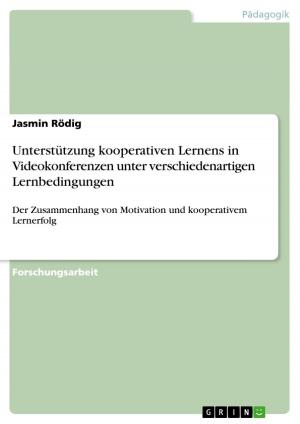Equipping Teachers with ICT Skills for Pedagogical Integration in Uganda: An Evaluation of Policy Implementation in Jinja Municipality
Nonfiction, Reference & Language, Education & Teaching, Administration| Author: | Ismail Luwangula | ISBN: | 9783656322061 |
| Publisher: | GRIN Verlag | Publication: | November 27, 2012 |
| Imprint: | GRIN Verlag | Language: | English |
| Author: | Ismail Luwangula |
| ISBN: | 9783656322061 |
| Publisher: | GRIN Verlag |
| Publication: | November 27, 2012 |
| Imprint: | GRIN Verlag |
| Language: | English |
Master's Thesis from the year 2011 in the subject Pedagogy - School System, Educational and School Politics, grade: ABBA, East China Normal University (International Center of Teacher Education), course: International Master of Education in Education Leadership and Policy, language: English, abstract: The promise of ICT in enhancing socio-economic development has prompted several countries including Uganda to integrate it in their education systems. However, integrating ICT in education requires a computing teaching force. Uganda developed a policy to guide ICT integration in Education. This policy emphasises equipping teachers with ICT skills as a cornerstone for implementing ICT in the country's schools. This study therefore sought to assess the strategies being used to equip teachers with ICT skills and to evaluate whether the implementation of the policy so far has had any impact on teachers' ICT skills so that more strategies for the implementation of the policy could be suggested. A mixed methods design was used to gather data. Two data sources were used, (i) government documents and (ii) teachers' responses to a questionnaire. A total of 140 respondents from 20 schools were selected to participate in the study. Data were analyzed both qualitatively and quantitatively. Descriptive statistics such as frequencies and percentages were used to describe the responses from the questionnaires. The Chi-square test of independence was also carried out to compare some findings. The study established that integrating ICT in pre-service training, school-based training, short-term courses and workshops were the strategies being used. In spite of the policy's emphasis on integrating ICT in pre-service teacher training, it was evident that teacher training institutions had not institutionalized the integration of ICT in teacher education. It was recommended that school-based training should be emphasized to make the training more relevant to teachers' contexts and that teacher training institutions should institutionalize ICT in teacher education to ensure that all newly qualifying teachers are equipped with ICT skills. It was also recommended that the ministry of education takes the initiative to bargain for cheaper customized ICT training for teachers with institutions that offer ICT training.
Master's Thesis from the year 2011 in the subject Pedagogy - School System, Educational and School Politics, grade: ABBA, East China Normal University (International Center of Teacher Education), course: International Master of Education in Education Leadership and Policy, language: English, abstract: The promise of ICT in enhancing socio-economic development has prompted several countries including Uganda to integrate it in their education systems. However, integrating ICT in education requires a computing teaching force. Uganda developed a policy to guide ICT integration in Education. This policy emphasises equipping teachers with ICT skills as a cornerstone for implementing ICT in the country's schools. This study therefore sought to assess the strategies being used to equip teachers with ICT skills and to evaluate whether the implementation of the policy so far has had any impact on teachers' ICT skills so that more strategies for the implementation of the policy could be suggested. A mixed methods design was used to gather data. Two data sources were used, (i) government documents and (ii) teachers' responses to a questionnaire. A total of 140 respondents from 20 schools were selected to participate in the study. Data were analyzed both qualitatively and quantitatively. Descriptive statistics such as frequencies and percentages were used to describe the responses from the questionnaires. The Chi-square test of independence was also carried out to compare some findings. The study established that integrating ICT in pre-service training, school-based training, short-term courses and workshops were the strategies being used. In spite of the policy's emphasis on integrating ICT in pre-service teacher training, it was evident that teacher training institutions had not institutionalized the integration of ICT in teacher education. It was recommended that school-based training should be emphasized to make the training more relevant to teachers' contexts and that teacher training institutions should institutionalize ICT in teacher education to ensure that all newly qualifying teachers are equipped with ICT skills. It was also recommended that the ministry of education takes the initiative to bargain for cheaper customized ICT training for teachers with institutions that offer ICT training.















